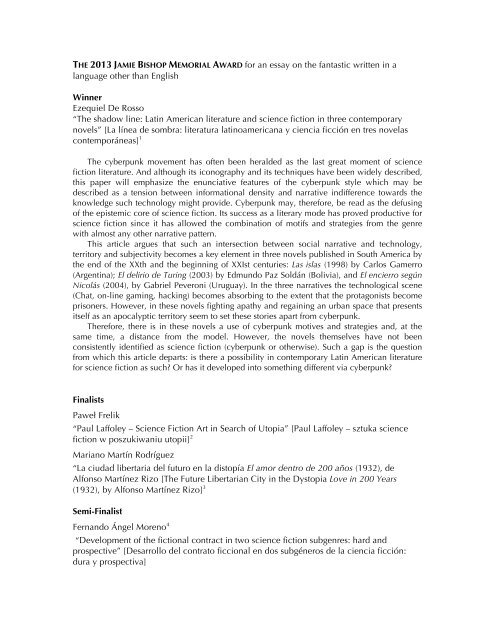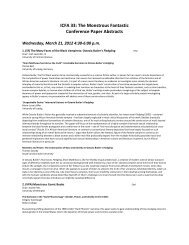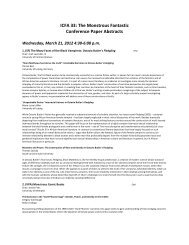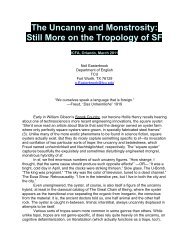pdf of titles of all winning essays and abstract of first place winner
pdf of titles of all winning essays and abstract of first place winner
pdf of titles of all winning essays and abstract of first place winner
Create successful ePaper yourself
Turn your PDF publications into a flip-book with our unique Google optimized e-Paper software.
THE 2013 JAMIE BISHOP MEMORIAL AWARD for an essay on the fantastic written in a<br />
language other than English<br />
Winner<br />
Ezequiel De Rosso<br />
“The shadow line: Latin American literature <strong>and</strong> science fiction in three contemporary<br />
novels” [La línea de sombra: literatura latinoamericana y ciencia ficción en tres novelas<br />
contemporáneas] 1<br />
The cyberpunk movement has <strong>of</strong>ten been heralded as the last great moment <strong>of</strong> science<br />
fiction literature. And although its iconography <strong>and</strong> its techniques have been widely described,<br />
this paper will emphasize the enunciative features <strong>of</strong> the cyberpunk style which may be<br />
described as a tension between informational density <strong>and</strong> narrative indifference towards the<br />
knowledge such technology might provide. Cyberpunk may, therefore, be read as the defusing<br />
<strong>of</strong> the epistemic core <strong>of</strong> science fiction. Its success as a literary mode has proved productive for<br />
science fiction since it has <strong>all</strong>owed the combination <strong>of</strong> motifs <strong>and</strong> strategies from the genre<br />
with almost any other narrative pattern.<br />
This article argues that such an intersection between social narrative <strong>and</strong> technology,<br />
territory <strong>and</strong> subjectivity becomes a key element in three novels published in South America by<br />
the end <strong>of</strong> the XXth <strong>and</strong> the beginning <strong>of</strong> XXIst centuries: Las islas (1998) by Carlos Gamerro<br />
(Argentina); El delirio de Turing (2003) by Edmundo Paz Soldán (Bolivia), <strong>and</strong> El encierro según<br />
Nicolás (2004), by Gabriel Peveroni (Uruguay). In the three narratives the technological scene<br />
(Chat, on-line gaming, hacking) becomes absorbing to the extent that the protagonists become<br />
prisoners. However, in these novels fighting apathy <strong>and</strong> regaining an urban space that presents<br />
itself as an apocalyptic territory seem to set these stories apart from cyberpunk.<br />
Therefore, there is in these novels a use <strong>of</strong> cyberpunk motives <strong>and</strong> strategies <strong>and</strong>, at the<br />
same time, a distance from the model. However, the novels themselves have not been<br />
consistently identified as science fiction (cyberpunk or otherwise). Such a gap is the question<br />
from which this article departs: is there a possibility in contemporary Latin American literature<br />
for science fiction as such? Or has it developed into something different via cyberpunk?<br />
Finalists<br />
Paweł Frelik<br />
“Paul Laffoley – Science Fiction Art in Search <strong>of</strong> Utopia” [Paul Laffoley – sztuka science<br />
fiction w poszukiwaniu utopii] 2<br />
Mariano Martín Rodríguez<br />
“La ciudad libertaria del futuro en la distopía El amor dentro de 200 años (1932), de<br />
Alfonso Martínez Rizo [The Future Libertarian City in the Dystopia Love in 200 Years<br />
(1932), by Alfonso Martínez Rizo] 3<br />
Semi-Finalist<br />
Fern<strong>and</strong>o Ángel Moreno 4<br />
“Development <strong>of</strong> the fictional contract in two science fiction subgenres: hard <strong>and</strong><br />
prospective” [Desarrollo del contrato ficcional en dos subgéneros de la ciencia ficción:<br />
dura y prospectiva]
1 This essay appeared in Spanish in: Revista Iberoamericana, 78.238-239 ( 2012): 311-28. Special<br />
issue on Latin American science fiction.<br />
2 This essay appeared in Polish in the collection Inne bębny. Różnica i niezgoda w literaturze i<br />
kulturze amerykańskiej [Different Drummers. Difference <strong>and</strong> Dissent in American Literature <strong>and</strong><br />
Culture]. Maria Curie-Skłodowska University Press, 2012.<br />
3 This essay appeared in Spanish in Ángulo Recto 3.1 (2011)<br />
(http://www.ucm.es/info/angulo/volumen/Volumen03-2/varia03.htm).<br />
4 This essay appeared in Spanish in Interlitteraria 16.1 (2011): 247-68.





